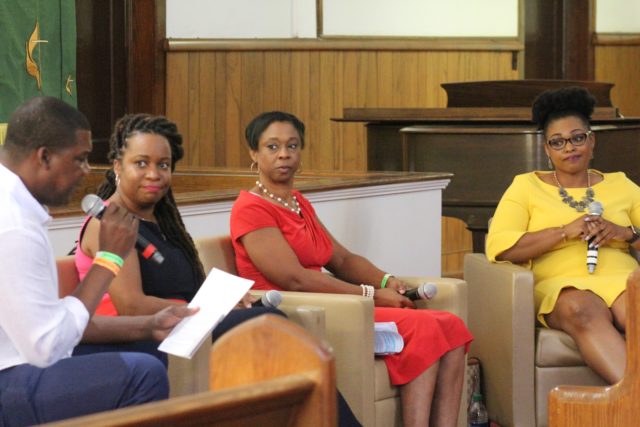
By Idrissa N. Snider
For The Birmingham Times
One of the more challenging fields for African Americans remain STEM (Science, Technology, Engineering, and Math) but there are several ways to succeed, a group of panelists said during a discussion at Birmingham’s Freedom Fest last week.
Crowds gathered in Kelly Ingram Park for entertainment that included Birmingham’s Ruben Studdard, neo-soul singer Musiq Soulchild, and rap pioneer duo 8Ball & MJG while others sat in on panel discussions.
Cracking Codes: Power of STEM was held at St. Paul United Methodist Church and featured a number of the area’s top entrepreneurs including Denise Gregory, a professor of chemistry at Samford University, Dr. Rayna Dyck, a dermatologist from the Skin Wellness Center and Adrienne Starks, Founder and CEO of Stream Innovators.
The panel was moderated by Ernie Williams, of Alabama Power Company.
“Freedom Fest is an awesome opportunity for each of us to share our success and empower others to continue to keep pushing forward and lifting as we climb,” Gregory said.
During the panel discussion, she said that STEM fields often lack diverse representation but told the crowd to understand “there’s genius inside of you, and in our communities. STEM doesn’t have to look a certain way, but everyone must be at the table.”
Despite the major contributions made by African Americans in STEM fields, many refrain from participating in studies or other medical projects that could be beneficial to the community because often there is an element of distrust between blacks and medical professionals.
The reluctance can be attributed to doubt from patients who have had experiences where they felt they were not being heard by their physicians. #ListentoBlackWomen is a social media movement that was initiated to help bring attention to this problem. The mistreatment and harm of blacks that occurred in various scientific studies throughout the history of this nation, like the Tuskegee syphilis study, when black males were intentionally infected with the virus also contributes to safety concerns. “It’s extremely important that we have people in the fields like Dr. Dyck because people of color have to have people in these fields who will champion for us and are studying things that are important to us,” said Gregory.
The panelists mentioned that sickle cell anemia, skin treatments, and even cell phone facial recognition are just some of the many areas where blacks are underrepresented in studies.
Challenges
All three women talked about the challenges they faced and told personal stories about the pitfalls that sometimes detour women and people of color from entering into these types of professions.
“It’s difficult, and it’s challenging; you have to figure out how to endure. It’s hard and isolating. Yet, many of your battles are mental,” said Starks. Having the confidence to make it through graduate school and into the workforce is essential to the success of African Americans going into the STEM professions.
Starks reminded the audience that retention in graduate programs for STEM-related disciplines affects students from all walks of life. When considering the obstacles many first-generation college students face, it makes it especially difficult for students to endure the rigors of obtaining STEM degrees.
Dyck recalled a heartfelt story when she wanted to forfeit her studies, but she found the courage to finish her program. With tears in her eyes, she mentioned that it was her parent’s faith in her and the words of another black staff member at the institution where she attended school that helped her to overcome imposter’s syndrome, which affects many women and people of color because some individuals doubt that they deserve to occupy certain spaces.
One of the ways to combat these feelings of inadequacy is to ensure support for our youth and students of color who desire to work in the STEMs, said the panelists.
They also encouraged the audience to “help create and support pipelines for women and underrepresented communities.”
“Even if you don’t understand what that person is going through –support consortiums, be encouraging,” said Starks.
The panelists mentioned it’s never too early to get involved. Gregory stressed parents should find internships for their children between the ages 14-16. She said, “I am constantly championing increasing minorities in STEM fields. As an ongoing effort through my work at Samford University, I host the Minority Youth Science Academy (MYSA) during the summer for rising 10th-12th grade students. This is a four-day residential program that gives students across the southeast a hands-on experience with a focus on STEM.”
This way, they are pre-exposed to what an actual role may encompass and are better equipped to figure out what they would like to pursue as a career.
Dyck said she was hopeful because “the same restrictions are not being put on our youth.”
Starks added, “We’re preparing to empower our people.” With genius and the intellectual capacity to change the world, black women in STEM are cracking codes to building stronger thriving communities.
For more information on MYSA, visit www.samford.edu/go/mysa.
Click here to read more stories from Birmingham Freedom Fest.



